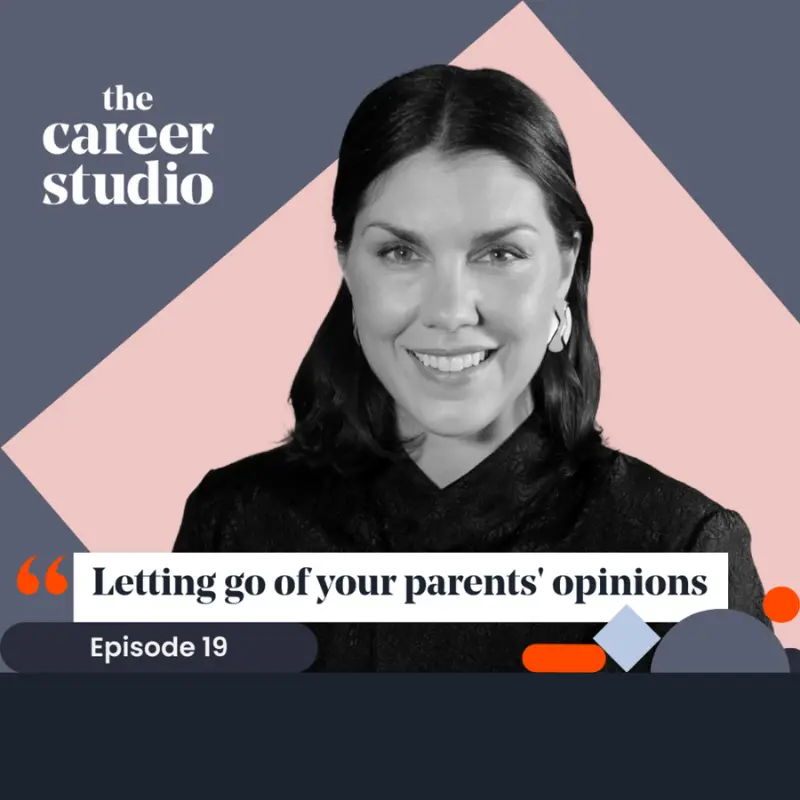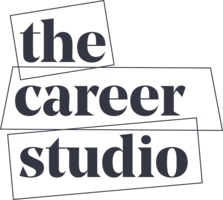Letting go of your parents' opinions

Oftentimes the reason we’re stuck in our careers is because we’ve been building it against someone else’s model for success and fulfillment - and this model often comes, inadvertently, from the spaces where we were raised. If your parents have a lot of opinions, or if you find yourself anxious about pleasing your parents, you won’t want to miss this episode. As letting go of what they think you should do is essential to creating a career and life on your terms.
In this episode I cover.
- The model I was raised in and how this influenced my opinions about what I did early on in my career.
- The reactions that my parents had to my decision to become a coach
- The reactions my clients’ parents have had to their own career reinventions
- What to remember and focus on if your parents’ second-guess the professional or personal decisions you’re making.
Related episodes
Are you ready to create an energizing career you love?
You can create a career that is simply an extension of who you are and how you want to live your life. If this sounds like what you’re after then schedule a consultation. We'll get to the bottom of what's going on for you. And exactly where you need to focus to bring your career and life into alignment. It's free!
For more from The Career Studio
Transcript
Welcome to the career studio podcast, where we boil down the noise and focus on the core concepts, essential for building an energizing career you love. One that is simply an extension of who you are and how you wanna live your life. Anyone can do it. It's just a matter of knowing what to focus on.
Hello. So I am recovering from losing my voice, so I'm a little bit.Husky, but we're just gonna record this anyways. Today I'm really excited to talk about this topic of letting go of your parents' opinions, and I'm excited to talk about it because it was such a real hurdle for me in my own journey to creating a career and a life that feels good.
And really feels like a reflection of who I am and how I wanna spend my time on this planet. And I guess I'll just start by saying that there is no denying that the house we grow up in and the environment we grow up in shapes us, right? Nature and nurture, right? So this is very much nurture. We are very much the product of where we were born, where we were raised, and by whom.
And a lot of us grew up in an environment with a lot of opinions about who we should be and what is acceptable. Even if these opinions weren't overtly or dogmatically stated, they were still absorbed. By who our parents are and what they chose to do in their careers and who they surrounded us by, in terms of our community and our educational system.
And all of this will have impacted how we see ourselves and how we see what is possible for ourselves in our life and how we interpret what is right and successful. And really what I often see amongst my clients is they have usually unintentionally created their career and life around a model that they learned in childhood.
So I will start with an example from my own experience and then I'll add a few examples from my clients. So I grew up in a house where academic and intellectual rigor was prized. The school systems I was put into, typically the parents worked in corporate jobs. In finance or consulting or politics or medicine, kind of very traditional or serious paths.
My father was a scientist and a doctor. He believed that psychology was a waste of time, that it was hopeless, that it didn't create any impact. And there was very much a narrative in my house that creative professions were unstable and hard to be successful in. And that, you know, when you go out and you go to university, the major that you should choose should be one that was applicable and relevant to a serious job in the real world.
And so what all of this meant for me, Is that when it came time to start thinking about my career, I guess the really, the first time is thinking about what major I wanted to select, which is why I brought it up. Even though I was inherently drawn to things like psychology and art history and anthropology, I eschewed all of that because it didn't feel serious. It didn't feel like I could get a quote unquote, good job with those degrees. It didn't feel like something my family would accept. I mean, I never asked them. Right? Maybe they would've accepted it, but this is what I believed. This is how I made my decision.
And so I chose international relations because a big part of that degree was economics and that felt very serious and professional, and I thought it would look good. Right? I thought that would help me get a job. Again, I didn't ask anyone this. These were just the assumptions I made. And ultimately, as I went into the professional world, I chose marketing and advertising as it kind of allowed me to be creative, but within the structure of the corporate world, which was safe and something that felt correct, given the environment and school system I was brought up in.
So, you know, everyone's environment shapes them in this way, especially when you're really young, right? Of course, that's gonna be the model in which you navigate the world. So here are just some other examples that I've come across in coaching my clients and talking to people about their career. So I had a client who ended up in finance because the narrative in her home was to always choose the safest, most reliable job that would give you a good salary and benefits, and that that was the most important metric when choosing your career path. So she chose finance.
I met a woman on a consultation who was raised to believe that mathematical and quantitative jobs were the best and most prestigious. Like this was considered a real quote unquote career path, and so she had ended up in kind of risk management consulting, even though she found that work incredibly dry and always an uphill battle. Like she didn't like it. Equally, she had a narrative that work shouldn't be fun, which I believe was also part of her upbringing.
You know, I often see clients choose the same industries as their parents, like finance or pharmaceutical or law, because this was the model that was, that created a successful life, right? They created the environment that they grew up in, and so they see this as the path towards a successful life, right? If, if that's what my parents did, then I know that that's a model for success. So I will map myself onto that.
Another belief I typically see come up that's kind of shaped by the parents is believing that because your parents stayed in the same job or sector their whole career, that there's something wrong with you for not wanting to do that, right? For hopping around jobs or wanting to shift your career to something completely different. You know, if you haven't seen that as a model in your own life, then it often can make people feel really uncomfortable or nervous to embark on that because it's not something they've seen done successfully. In their home environment.
So I hope some of this resonates for you. And you know, these beliefs, they don't necessarily get in your way if you are energized by what you do, right? So plenty of people copy what their parents did, but they really enjoy it. Maybe they're very similar to their parents and they have similar strengths and interests and priorities, and so modeling their life in a similar fashion is not a problem, and you know, there's nothing wrong with that. But where it starts to be a problem is if you are unhappy professionally, right? If you're doing something that doesn't bring you energy, if you are feeling drained every day by the work, if the environment isn't a good fit, then it starts to be interesting to look at, well, why are you in that environment? Right. What are the beliefs that have led you to create your career in this space?
Now, of course, it's not always beliefs that were molded by your parents. There's, there's tons of other reasons people end up in professions that aren't a good fit. But this is what this episode is about because so often there are a lot of beliefs molded by the family, and it's often that when you find yourself in this position, right? If your parents' opinions really matter to you or you've created something that's very, very similar to what your parents did, you may have a belief that this is the only model for being successful or on an even deeper level, that this is the path you need to follow in order to be worthy, right? Like, like only one path equals success.
And of course the secret is there isn't only one model, there's infinite models, right? Because the whole foundation of my business is that it takes less energy to be yourself. And each one of us is unique as a fingerprint. And so our model for success will inevitably be different than our parents.
And oftentimes the reason you are bored or burning out or feeling stuck is because you have been building your career and life using someone else's model for success and fulfillment instead of really building it against your own model. So if you find yourself in this space and you wanna recreate your career and your life on your terms, the work then becomes letting go of the beliefs of what you think your life should look like and really owning who you are and what genuinely lights you up. Right? And this can feel uncomfortable if we are attached to our parents' opinions about us, or if we genuinely believe there's only one path, like one path is better than the other, and we kind of discount what feels good to us as not worthy.
But usually when you feel bored or stuck or burned out, or work is just really not working and you are not thriving, you can recognize that the environment you're in, despite your ambition of it being the one, despite you thinking that that company, that industry, that job title would be your model for success, you start to realize that actually this isn't feeling good. This isn't getting me towards the life that I want or the career that I want. So this can often be the momentum to opening the door to considering other career paths as a more reliable or an alternate path towards success.
Right, so that's like kind of the first hurdle is, is recognizing that the path you've been on is not your path. And if it's quite parallel to what your parents did or what your kind of community does and having a feeling, you might wanna go in another direction that's maybe more unchartered. Maybe you don't know as many people doing that, or maybe you're so far from what your parents did that it feels uncomfortable. But kind of owning that, that is where your energy is going, right? That's what you're curious about. That's what you wanna explore more. This is kind of the first hurdle is even just opening the door to considering other paths and recognizing that, Ooh, maybe I fit more in this other space. Okay. Which is not a space that I feel comfortable in because I don't have a model of what that looks like.
So the second part of this conversation is about letting go of their opinions that are gonna bubble up as you explore other things and as you recreate your career and your life on your terms, not theirs. A lot of parents are gonna share their opinions and they will not necessarily always be supportive in the way that you are looking for. And so I wanna give you some examples now to make this more real. And I'm gonna start with myself again. So, when I decided to become a coach, this was a very foreign career path to my parents. They knew no one in their circle who was a coach in kind of a serious way. I think they, they knew a few women who'd done it kind of later in their life as kind of a small side thing.
So my mother asked me, isn't coaching something women do after they've had children as kind of a part-time gig? And my dad said, it doesn't really feel like you're using your MBA. And then the first job I took in coaching was at a, a very successful training and coaching company. And my dad asked me, you know, I think they looked at their website and it was a lot about, you know, creating a career in life that you love. And you know, when I went home to visit them, they asked me, you know, what universities did the founders go to? And when I told them, well actually, you know, they went to Georgetown and UVA, that actually seemed to placate him because those are very good American universities. And so he was like, oh, well, well, that, it must be well respected.
But you can see he had a lot of opinions about, you know, something that was a little bit, you know, he would probably describe it as very woowoo too emotionally lead. Well, not hard facts and data and corporate and something that he's familiar with. Okay. So these were the, uh, initial opinions that my parents shared with me, which, you know, didn't make me feel great right? It, it made me at the time, right, I was like this, it didn't feel supportive. It certainly wasn't what I would've loved to have heard, right? I wanted them to tell me, awesome. That sounds great. We're so proud of you. Keep going. That's not what I got.
Okay, and I, I'll talk more about kind of what I did with that, but before, let me just share some of the other things I've heard, like what parents have said to their kids as they start to recreate their career. So I posted about this, a short post on LinkedIn recently. I. And this connection of mine texted me to say, oh my God, I loved your post. And then she shared that she was talking with her dad and she told him, you know, I'm so excited about this opportunity. And then she presented the opportunity and after that he said, it sounds like that's beneath you.
Okay. So not, not supportive of this thing she was excited about. I had another client. As one of his career paths, he was exploring working in real estate, so kind of buying property and renovating it. And he was like really interested and excited by it. He didn't know if it was gonna be "the thing", but he was like really getting motivated and energy from exploring this idea. And he told his mother, and when he did, she responded by saying it didn't sound like it was the right path for him that didn't seem like very him, like she was surprised that that's what he was looking at. Okay, so again, not like Go for it!. Love it!. Keep going!. Right?
Another one of my clients told her mother that she was working on thinking through a career change, and her mother's response was, the most important thing is that you should be well paid, and then added that she thought that my client and her husband were kind of procrastinating on sorting out their careers. And this was very confronting to this client because she'd spent her whole life only making her career decisions around money, right? And, and kind of the career or the job looking good. She was really trying to do something that felt good and that really reflected who she was and what she was interested in. So her mother, kind of telling her what her priority should be when that wasn't her priority at all, was not what she wanted to hear.
I had another client, this will be my last example for now. She told her parents that she wasn't happy in her career, and her parents' response was, well, we don't know anyone who actually likes their job, and that that's normal. It's like normal not to be happy professionally. Okay, so I share all this because all these parents, all these people, right. It is vulnerable looking for a new job, right? Exploring something new. It's ambiguous. You don't know where you're going. You're kind of trying on this new part of you, kind of exploring what seems interesting and fun. It's nascent. It's a little baby plant. You're a little baby plant of yourself that you're kind of putting out there and stress testing, and when you're a parent, that's very important, obviously, figure in your life doesn't give you this response of ,you are awesome! That's great. Keep going. It can be very demotivating if you let it get to you, right?
Because what you want to hear is support. You wanna hear, go for it. Whatever you decide, we are there to support you. You should really do the thing that makes you feel good and, and marries up with your priorities. But you know, these parents, they're not bad. They're not evil. They haven't done this intentionally. What they're doing is just projecting their opinions, their fears, and their insecurities on the decisions you're making in your life, right? This is their shit that they're projecting on you. And if you listen to them instead of listening to yourself, then you get off track. Right, or if you let them get in your head right, and make you sad or insecure, right? You also are gonna get off track, right? Cuz you're gonna stop or slow down. Right, and so if you listen to these fears and insecurities, you end up building your life based on their opinions instead of your opinions. And your feelings about what feels energizing and right for you.
And so a lot of people that I work with have inadvertently done this, right? They've built their career and life around other people's models for success. So in my situation, you know, it helped me when my parents were saying these things for me was, you know, I, I'd spent so many years feeling lost and burned out and really unhappy professionally and coaching felt so different. It felt like a 180. I knew inside of me that it was right because I had talked to a bunch of people. I'd started doing some volunteer coaching, and that was the data I needed. It felt so right in my body that that is what carried me through. Not everyone has that level of conviction when they start to hear their parents well-meaning, but sometimes unhelpful pieces of feedback.
Right, so it's really important to remind yourself to check in with yourself, right? To ask yourself, what interests me? What feels fun and exciting? What are my priorities? And exploring things that meet that. And you might not have certainty yet. You might not have the level of conviction that I shared. So you can at least fall back on knowing that you are exploring the things that make you feel good. And you don't have to make a decision yet, right? But if you keep exploring the things that feel good, eventually you'll find something that clicks, that you feel excited about, that feels so much different than how you're feeling at the moment professionally, that you know that this is gonna be a better space for you to thrive than what you're doing at the moment.
And along the way, people, including your parents, they're gonna have opinions about what you're doing. If you do what they know, it makes 'em feel safe because they know it, right? It's familiar to them. And when you do something that's different than their own operating model, it can make them feel nervous or anxious or uncertain. And so they are wanting you to behave in a way that makes them feel better. Okay. They want you to be in their comfort zone so they can feel comfortable, right? Sometimes it can also look like people want you to stay in a similar lane to them so they can feel better about their own decisions, right? You know, you breaking a mold, you going after your life on your own terms, that can bring up their own regrets about what they could have done or what they should be doing, and this can feel uncomfortable.
I'm talking about this whole podcast in the context of our parents' opinion, but it can also manifest in our social circles, right? Sometimes when you recreate your life on your own terms, your friends or your peers can react in a way that isn't supportive because you going after the things that matter to you, make them feel like they should be doing something else. And that can bring up their own insecurities and self-doubt and say they want you to stay in your box so that they can stay in their box and feel good about it. So this is basically it. This is the, this is the episode. You wanna be mindful of your parents' opinions, they usually come from a good place. But if you are listening to them over your own internal voice, this is how you get out of alignment.
You have to unwind from what they want and what they taught you to create the career and life that really lights you up. You have to pay attention to what feels good in your body, what feels energizing, what feels interesting. What feels exciting, cuz this is how you get out of your head. You know your head, you can talk yourself into or out of anything. You can make a rational case for things, but the body doesn't lie. And what's drawing you, the ideas you have, they feel energizing and interesting and you wanna pay attention and you wanna trust that.
Trust where you're drawn to and explore that in a structured way. And if your parents don't understand that, that's okay, that's okay because they're not you. And so I'm gonna close this episode with a quote from the absolutely brilliant Glennon Doyle in her book, Untamed.
And she said; " every time you're given a choice between disappointing someone else and disappointing yourself, your duty is to disappoint that someone else. Your job throughout your entire life is to disappoint as many people as it takes to avoid disappointing yourself".
I love that quote, and so I'll end by saying, don't be afraid to disappoint your parents, because the greater risk is disappointing yourself. Have a great week.
Hey, if you're ready to create an energizing career you love, one that is simply an extension of who you are and how you want to live your life. Then I wanna invite you to schedule a consultation. We'll get to the bottom of what's going on for you. And exactly where you need to focus to bring your career and life into alignment. It's free. Just head on over to thecareer.studio/schedule to find a time that works for you, or if you're enjoying and getting value from these episodes, I'd love you to leave a short review on whatever podcast app you use.
This helps other people like you find and get value from the podcast too.



